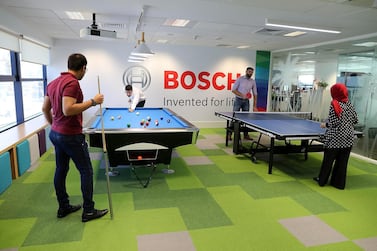Employees in the UAE are among the best paid in the world, yet lifestyle factors such as being away from family help to drive a desk culture involving significant overtime.
A recent survey found employees in the Emirates clocked up an average of 24 hours of overtime per month, the most in 10 countries surveyed by insurance company Maxis Global Benefits Network.
Employees in Hong Kong and the US came in second with 23.2 hours a month overtime on average.
Other nations surveyed in the study, which comprised of data from 1,000 respondents, included Mexico, India, South Africa, Russia, France, the United Kingdom and Brazil.
Across the international markets analysed by the study, 87 per cent of respondents from Mexico said they worked in a 'desk time' culture, meaning employees felt they need to be seen working significantly beyond their contracted hours. India came next at 83 per cent, while in the UAE it was at 71 per cent.
Residents of the top three countries for overtime were also found to earn significantly higher wages than most other nations, according to studies. And in countries with high numbers of immigrants, like the UAE, US and Hong Kong, experts said work was often a way for people who are far from home to stem the loneliness.
Vijay Gandhi, a Dubai-based director for the Korn Ferry Products Group, which specialises in talent management and human resources, said overtime was fairly common for people who travel to the UAE for work leaving their families back in their home country. Single people also tended to do more overtime, he said.
"In the industrial sector or in sales roles, overtime tends to be given at the supervisory level. Those who take it tend to be single, where for lifestyle reasons they would choose to work more," said Mr Gandhi.
Sujit Sukumaran, a business coach and two-time TEDx speaker, said he suspected a number of other factors may also be at work.
He said some working abroad may want to cram in the most possible hours to make and send money home in order to support their families abroad or their needs here. Alternatively, they may have a lackluster social life, with work becoming their main obsession. "Sad but true," said Mr Sukumaran.
Finally, others may not be good at time management, so they end up either whiling away the hours or accepting more than they can handle.
Some employers also load young, single employees with extra work, claiming early on in a career was the time to work hardest.
"A case in point is Joey Tocnang - who was working at a firm in Japan and just 27 years of age - dying from cardiac failure as a result of a working overload. The Japanese even have a word for it 'karoshi,'" said Mr Sukumaran.
A study by HSBC last year showed a fifth of foreign nationals doubled their salaries when they relocated to the Emirates. While higher wages and an aspiration lifestyle attracted people to work in the UAE, life coaches said workers often used overtime as a way to escape loneliness.
“They pour their heart in to their work because that is a way for them to find satisfaction and maybe fill up their time,” said Leila Atbi, a life coach based in Abu Dhabi.
“They don’t realise until it becomes their whole life. We need to be careful about keeping a certain balance between relationships leisure time, rest, personal growth."
In Ms Atbi's experience, those working in the private sector in finance, accounting and auditing fields were known to clock up long hours.
Her daughter would previously work until 3am and even go into the office on weekends to finish work, but she has recently to a less stressful role.
“She said ‘mama, what will I do with my extra hours?’ She wasn’t used to a 'normal' sort of lifestyle," said Ms Atbi.
"She started doing more physical activities and going out with her friends and she is now much healthier and happier. I saw first-hand the difference it made."
Dubai-based executive coach and author Dawn Metcalfe said an understanding of what a 'normal' working day constitutes was based on an individual's background.
“We have a growing knowledge-based economy and our office workers are made up of hundreds of nationalities, all with different ideas of professional cultural norms,” she said.
She also said employers need to be educated on that front if global workplace cultures were to move away from extensive overtime.
“When we think how much of that time is actually used working smartly — my guess is very little," she said.








